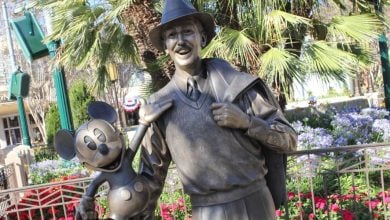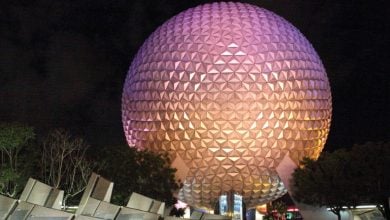Magic Kingdom’s Secret Second Level Exposed, Here’s What You Can’t See
We spend a lot of time talking about what’s in your hand when you’re walking down Main Street, U.S.A.—a warm Mickey pretzel, a gooey cinnamon roll, a cold brew float from the Main Street Bakery.

But today? We’re talking about what’s above your head.
If you’ve ever looked up while strolling down Main Street in Disneyland or Magic Kingdom, you’ve definitely seen the old-timey second-story windows, each with fancy gold lettering and a vintage business name. You might’ve even thought, “Cute touch! Makes it feel like a real town!”
But here’s the thing: some of those second floors aren’t just for show. There’s a whole world going on up there—offices, storage, tech rooms, even meeting spaces—that most guests never even realize exist.
So while you’re deciding between a churro or a Mickey bar, Disney’s management is literally upstairs making the park run. Let’s dig in.
Above the Bakery and Beyond: The Magic Kingdom’s Second-Floor Secrets

At Magic Kingdom, the second-story spaces on Main Street serve a few key purposes. And no, they’re not fake—at least not all of them.
Is there anything actually on the second floor on main street?
byu/BobTheCrakhead inWaltDisneyWorld
According to multiple former Cast Members (including some open-book threads on Reddit), the second floors include:
-
Executive offices for park managers
-
Conference rooms where Cast Members are briefed before parades and fireworks
-
Inventory storage for shops like the Emporium
-
Cast Member break areas
One Cast Member who worked in the Emporium described how leadership would hold meetings just above the sales floor—while guests were buying ears and pins below, operations strategy was happening upstairs in real-time.
Another described attending Parade Audience Control (PAC) briefings held in those very rooms. These are the folks responsible for crowd control during the big nighttime spectaculars, and before every show, they’d gather above Main Street to go over crowd zones, evacuation protocols, and performance timing.
Translation? While you’re scoping out your viewing spot for Happily Ever After, there’s a room full of Cast Members upstairs coordinating the whole operation.
Disneyland’s Upper Windows: Half Nostalgia, Half Nerve Center

Over on the West Coast, Disneyland takes a slightly different approach—but the concept is the same. The second stories are not just cute little facades.
Let’s break it down:
-
The Emporium has storage and Main Street West management offices upstairs.
-
The Opera House (where Great Moments with Mr. Lincoln plays) has park-wide audio control above it.
-
There’s a call center on the west side.
-
And yes, some windows open during parades to let the music pour out from hidden speakers.
Seriously—next time you’re watching Magic Happens or the Halloween parade, glance up. You might spot a window crack open just before the music kicks in. It’s all timed, all orchestrated, and most people never notice.
And then there are the scent machines. Ever walked past the Main Street Confectionery and been lured in by that heavenly vanilla aroma? That’s not by accident. Those smells are pumped out through vents and hidden piping, often tied into the second-story infrastructure.
So, yeah—those upper floors might not serve a guest-facing function, but they’re part of the full-on sensory experience that makes Disneyland what it is.
The Architectural Magic: When the Second Story Is… Kinda Fake
Let’s be real: not every window is real. Some of those second-floor “rooms” are basically glorified crawlspaces. Why?
It’s all thanks to forced perspective—a classic Disney design trick that makes buildings look taller and grander than they actually are. The windows get smaller as they go up, the rooftops slope in just right, and boom: the whole street looks bigger, deeper, and more theatrical.
So, some buildings? Yes, they have real upper floors. Others? You’d hit a wall if you opened the window. But whether or not there’s a usable room behind it, each one is part of the show.
The Windows Aren’t Just Pretty—they’re the Park’s Hidden Credits
Those gold-lettered names on the windows? They’re not random.
Every window is a tribute to someone who helped build the Disney parks—Imagineers, designers, execs, engineers. Walt wanted the second story to be like credits in a movie—subtle but meaningful for those who pay attention.
You’ll find Roy O. Disney, Marty Sklar, Rolly Crump, and Bob Gurr scattered across both coasts. At Disneyland, many of the names belong to original Imagineers from the 1950s. At Magic Kingdom, the tributes often lean toward those who helped expand the Florida project in the 70s and 80s.
It’s not just theming. It’s history in plain sight.
So… Can You Ever Go Upstairs?
Unless you’ve got a Disney ID and a backstage clearance badge, the answer is no.
These aren’t secret lounges or VIP areas—they’re working offices, storage zones, and operational control points. No behind-the-scenes tour is going to take you up there. The entrances are all backstage, locked down, and off-limits.
But that’s kind of what makes it fun to know about, right? While you’re debating which popcorn bucket to collect next, there’s a whole hidden layer of the park operating just above your head—invisible to the guest, but crucial to the magic.
Next Time You’re Eating a Turkey Leg on Main Street… Look Up
Main Street is designed to be warm, familiar, nostalgic. It’s “small town America” through a dreamy Disney filter. But it’s also a fully functioning control center—just disguised in striped awnings and window decals.
So next time you’re standing outside the Emporium waiting for fireworks to start, take a second. Look up. Because someone up there might just be calling the show.
And if the window cracks open and music starts? Don’t freak out. It’s just a little more Disney magic—from the floor above.






What a wonderful article. No speculation on what ride might close next or guessing what Disney might change. This was just interesting facts that many of us didn’t know. Thanks for the information. Next time I’m at Disney I will be sure to look up at the windows.😊